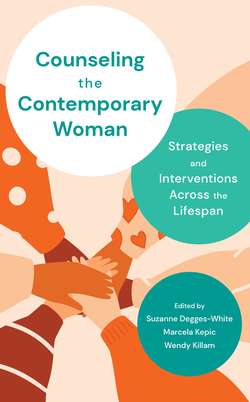Читать книгу Counseling the Contemporary Woman - Suzanne Degges-White - Страница 36
На сайте Литреса книга снята с продажи.
A Relational-Cultural Therapy Understanding
ОглавлениеRCT is considered a feminist therapeutic approach in that it values individual clients’ lived experiences, assumes a strength-based attitude, incorporates an egalitarian clinical relationship, integrates a multicultural perspective, focuses on change rather than acceptance, and conceptualizes an individual within the larger social, economic, and political context (Frey, 2013). The implication of traditional psychological models is twofold: (1) one must have power over others to have power, and (2) connection and relationship are a source of weakness rather than openness and strength (Jordan, 2018). Unlike these traditional models, where the individual is primary and the relationship is secondary, this theory looks at individuals within the context of their relationships—both personal and clinical (Jordan, 2017, 2018). A person’s level of development or actualization is not assessed by their achievement of individualization and autonomy or the strength of their boundaries (Comstock et al., 2008; Duffey & Somody, 2011; Frey, 2013). According to RCT, boundaries may be erected to protect against outside dangers, to insulate, or to gain power and ascend the prevertebral hierarchical ladder alone, untouched, and unaffected by others. Isolation, according to RCT, is not a source of strength; rather, it restrains individuals and maintains oppression.
RCT believes that one does not have to be alone to be strong. One does not need power over another to be powerful. Rather, individuals grow through and in connection to others. We do not enter, exist, or exit a relationship, whether minor or significant, without being affected. Every person we come into contact with regardless of the depth of the interaction affects us, and we in turn impact them. There is no limit to our need for or the benefit of connection (Jordan, 2017). We change and grow through relationships. Therefore, relationship are a source of strength, learning, and development for everyone involved. Our own vulnerability fuels change, and we need others to grow!
According to the theorists at the Stone Center, RCT is built on the following eight principles (Jordan, 2000, 2018):
1 Relational growth is ongoing throughout the lifespan.
2 Maturity is demonstrated by mutuality and engagement with others, not independence.
3 More complex and diverse relationships demonstrate growth.
4 Growth-fostering relationships (GFRs) are founded on mutual empathy and empowerment.
5 In a GFR, both people are affected, and both people grow.
6 A therapeutic alliance is built on a unique kind of mutuality.
7 Mutual empathy is the tool for change in counseling.
8 Authenticity and honest engagement are essential for mutual empathy to occur.
These RCT principles provided a revolutionized way of viewing individuals’ development that values relational competencies.
Culture is intentionally placed at the center of RCT (Jordan, 2018). In order to understand an individual, one must understand them within the context of their culture. This context often includes “experiences of isolation, shame, humiliation, oppression, marginalization, and macroaggressions [which] are relational violations and traumas” (Comstock et al., 2008, p. 280). These experiences often lead to internalized pain, which affects one’s ability to engage in relationships on both a micro (individual relationships) and a macro (connection to society) level. The fear and unease caused by historical and ongoing oppression motivates one to find safety through seclusion and separation, which translates to guarded, unauthentic personal relationships and a truncated potential for growth. Similarly, on a macro level, past traumatization encourages isolation from one’s community. Therefore, RCT “integrates multiculturalism, intersectionality, resilience, and strength-based foci into counseling practice” (Singh & Moss, 2016, p. 398). The goal of every counseling relationship is to increase the visibility of one’s multiple spheres of influence (i.e., friends, family, community, workplace, media, etc.) to see a person as their whole self (Jordan, 2017). Therefore, RCT uses multicultural and social-justice-informed practices to address difficult issues and promote authenticity.
While RCT emphasizes the need and value of relationships, the theory acknowledges that not all relationships are healthy. Unhealthy relationships are described with the term “power-over” (Jordan, 2017). These relationships do not exemplify mutual growth and development but rather an inequality of power where one person dominates over another. This power-over may be evidenced in extreme cases such as physical or emotional abuse but also in less extreme cases like when an individual loses their voice, does not act authentically, or cannot be vulnerable. A relationship where someone fears being rejected for their thoughts, beliefs, or appearance is an example of a power-over relationship that does not facilitate connection and growth.
